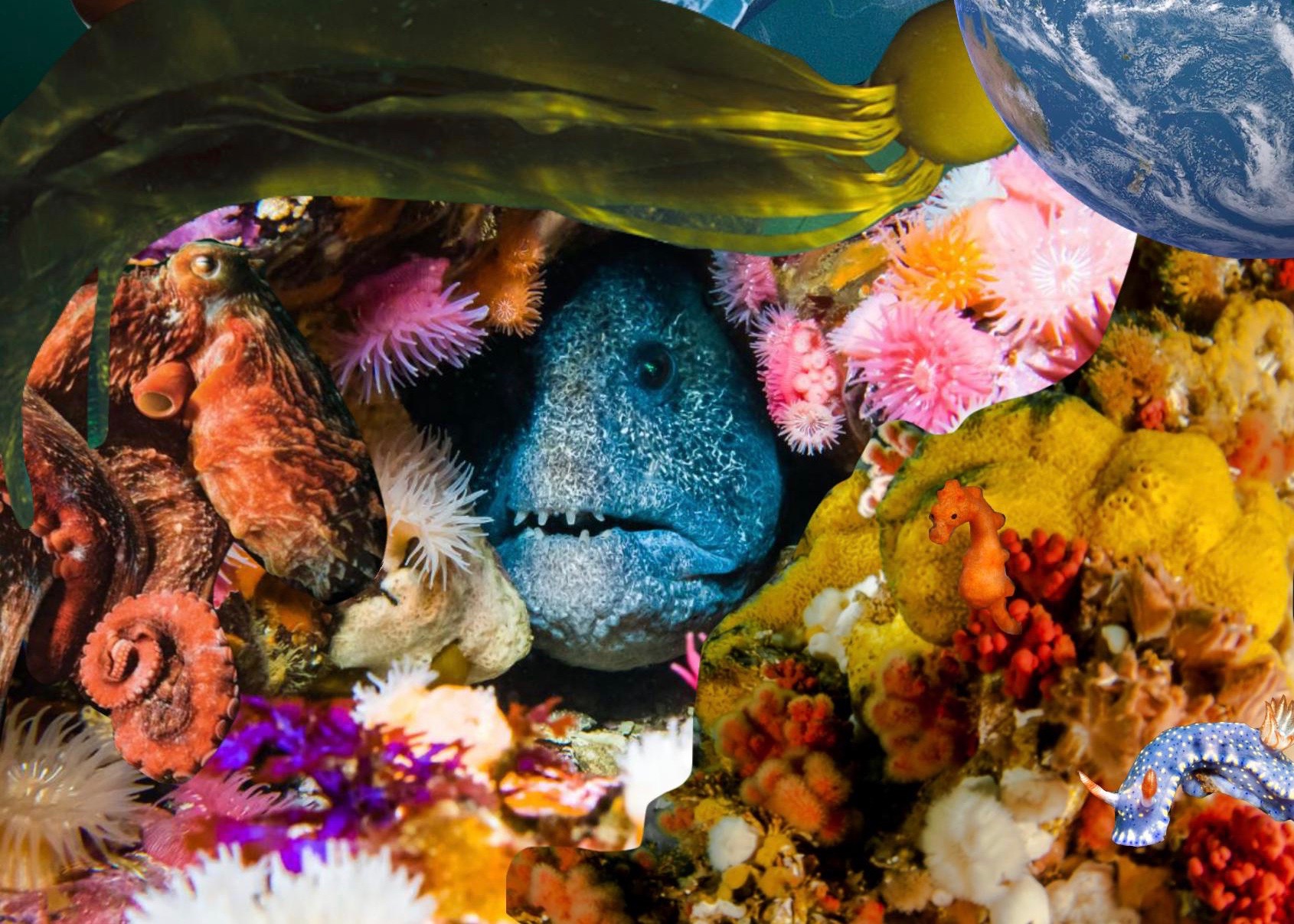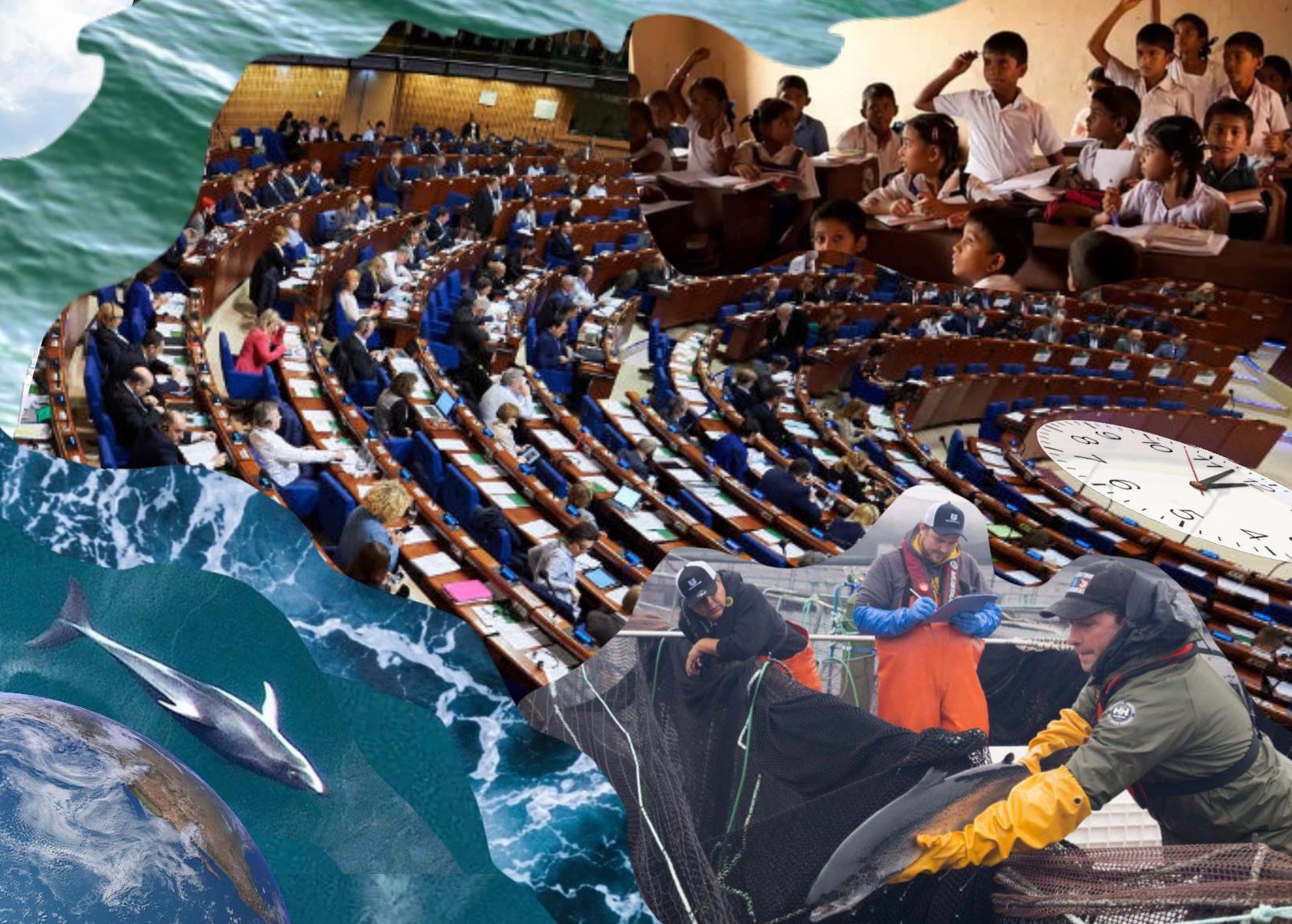
This piece represents a reflection on my learning’s thought the term including what I have now come to value in ocean conservation, have revealed about myself as a critical thinking, skills I have gained, future challenges I face, and how I have grown into the onion world. Each section of the mosaic represents one of these ideas.

This bottom right region represents what I have become to value and understand about ocean conservation. While I have always been amazed by the shear amount of fine tunings of DNA and evolution which has created this mosaic of life in our oceans, I never understood the power that they could hold for ocean conservation. I direct this in relation to the Seahorse in my collage, which on first appearance is small and may seem insignificant but as our professor Amanda Vincent has been able to produce, can become a worldwide icon in changing the fate of the protection of fish species and ocean conservation (Project Seahorse). The diversity of life also signifies that we will never reach true ocean conservation or sustainability if we aim to make every single entity in this complex puzzle happy. No matter it be wildlife, humans, economies or social aspects of the ocean, there is no congruent solutions that can provide a beneficial result to all involved parties. We therefor must not waste our time on such ideas. Instead we should be using overarching solutions as the beginning grounds, which from there must be adapted and modified into the local regimes in order to balance winners and losers in delicate ways the that bring upon local compromises.

This area represents what I have revealed about myself as a critical thinker. Coming from a biological background, I have always tended to hyper focus on what solutions can be made to protect the physical and biological ocean. Throughout my portfolio however, I have been required to expand my work into the domain of social and economic aspects of ocean conservation. While at times it was hard to wrap my head around, with each project I completed, I found myself strengthening my abilities to integrate how our ocean is intrinsically linked to people and economies across the world. In approaching ocean conservation issues, I can now see how the dolphin (biological), the boy (social) and the fishing vessel (economics) are often more than not, one and the same problem just in different disguises. While before this course I may have jumped to immediate conclusion that it was the ignorance of our species to willingly exploit our oceans to this degree, I can now see in reality, this is often the only option people have in order to make their way in life. Accordingly healing the ocean also starts with healing human relationships and connections.

This area represents the two skills I have learnt throughout the course that I believe will be most useful as I progress past graduation. The variety of audiences from elementary school classrooms, to fisheries workers and all the way up to the multinational conferences as depicted in this region represents my skills in using multimedia platforms such as podcasts, videos, art, or writing to reach the appropriate audiences. This skill will be incredibly useful for future work as ocean issues span a wide range of human dimensions that require the active participation of every human on the planet. Keeping audience engaged is also incredibly important and accordingly the second skill I learned as indicated by the clock is time keeping. Through having restrictions on the amount of time or words I could utilize for my projects, I was forced to compact my main ideas into short takeaways that kept the audience attentive. Likewise this skill is super important in the real world of policies where you are not only are you given a short amount of time to make your point but to also ensure your audience is taking away a message instead of an overwhelmment of details.

This section represents the challenges I face and how I plan to move forward. My tendency to think big picture sometimes gets in the way of my motivation and performance to make current change. I believe that all problems including those of the ocean generally stem from the same root problem of continued colonialism. It is this that makes me not want to navigate solutions through colonial regimes of research and decision making. That said, this is a huge and long task to dismantle and will come at the cost of much needed measures now. As I look back on my portfolio there was a few times when I focused on this idea, of which I would now go back and change. As I move forward though I need to recognize that there is still a lot of wins for the ocean being made under this system, such as Indigenous marine protected areas. Resultantly making do with what is currently here therefor should still be acted on in order to prevent ocean ecosystem collapse from occurring before its too late.

Finally the middle portion of the piece represents the movement of my self growth through the onion world as Dr. Vincent calls it, staring with my biologically focused ideals that eventually began swimming out and recognizing the social, economic, and then systems of governance until I reached my flippers out all the way into the big blue world.
When I think about one thing I could have done differently in this course, I believe that stepping out of my shell and sharing my ideas and thoughts more with group work discussions could have been beneficial to my learning and for gaining feedback. Looking back at my e-portfolio however, I am extremely proud of all the projects I have created. A substantial amount of time and effort was put into this course and I believe my e-portfolio reflects this work. All my projects together summarize my personality and abilities as an individual to create change in ocean conservation.